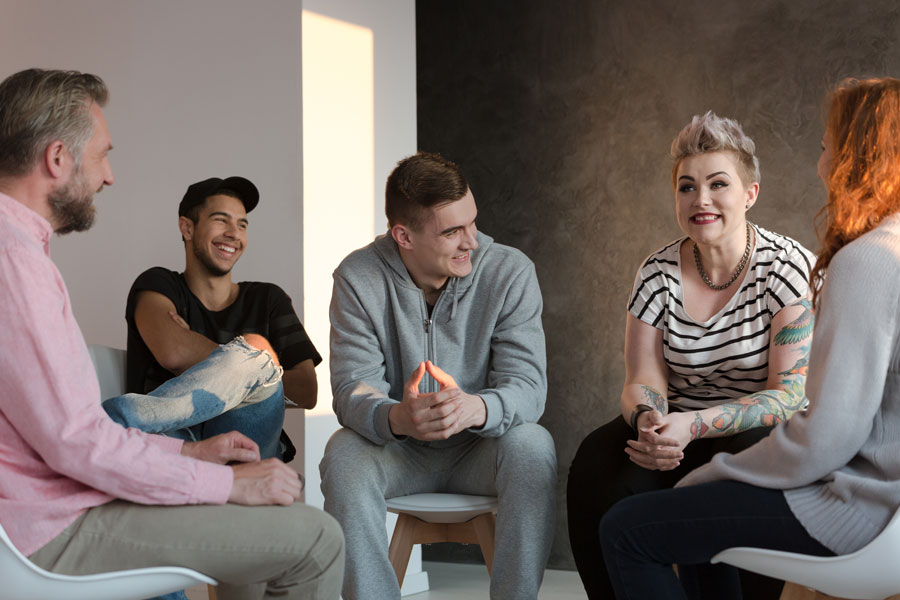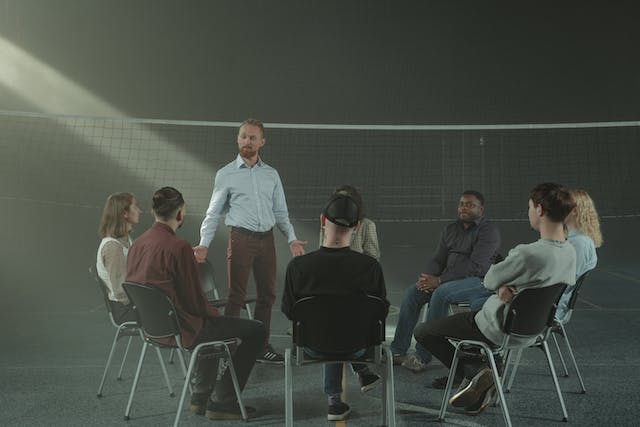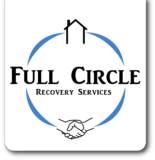Help is available
How to Start
Now is the time to make recovery your first priority
Identifying the most effective care for your treatment needs start with a prescreen to gather basic information for treatment recommendations.
This process begins with:
- The completion of the Referral and Screening Form and the Authorization to Release and Exchange Information Form.
- Preset appointment through our Outreach Staff arranged by calling the
INTAKE HOTLINE: (800) 829-5461. - An intake assessment with our professional staff to discuss your physical, mental, social, and emotional health history.
Treatment options available
Length of treatment will be determined on the results of your initial assessment.
Our Programs

Residential Program (RES)
Following your initial assessment, our intake team may recommend our Residential (RES) Program to support the beginning of your recovery journey. Residential treatment at Full Circle Recovery Services is rooted in a person-centered approach, offering a safe and structured environment where healing can begin. Our dedicated staff delivers high-quality, individualized care for individuals ready to take meaningful steps toward lasting recovery.
Residential Programming (RES) at Full Circle Recovery Services
Residential (RES) treatment is designed for individuals who have completed inpatient detoxification or who require a more structured, immersive level of care to begin their recovery journey from substance use and related mental health concerns. Residential programs offer a live-in, therapeutic environment with 24/7 support, helping clients focus fully on healing away from external stressors and triggers.
Who Residential Care Is Appropriate For
RES programming is appropriate for individuals who:
Have completed inpatient detox and need a safe, supervised next step.
Are experiencing significant substance use challenges that benefit from an immersive, structured environment.
Have co-occurring mental health symptoms that require coordinated care with addiction treatment.
What to Expect in Residential Programming
Residential care provides intensive, daily therapeutic services delivered in a supportive, 24-hour setting:
Individual counseling tailored to your unique needs and goals.
Case management to support coordination of care and planning.
Daily group therapy (typically scheduled seven days per week).
Clinical visits with nursing and medical providers.
Medication management when clinically appropriate.
Collaborative planning with community partners for transition to sober living, including transportation support where applicable.
Comprehensive mental health assessment and treatment integrated with substance use care.
Core Goals of Residential Programming:
Residential treatment focuses on helping individuals:
Develop stability, self-awareness, and coping skills.
Learn and practice healthy behaviors and relapse prevention.
Enhance social and life-skills to support long-term recovery.
Work collaboratively with staff to set and achieve treatment goals.
Therapeutic Approaches Used
Our clinical team employs a range of evidence-based therapeutic modalities, including:
Cognitive Behavioral Therapy (CBT)
Motivational Interviewing (MI)
Solution-Focused (SF) strategies
Dialectical Behavioral Therapy (DBT)
These approaches help address both substance use and related emotional or behavioral concerns.
Group Topics May Include:
Self-care and wellness
Relapse prevention and triggers
Family and relationship dynamics
Grief and loss
Conflict resolution
Self-esteem and coping skills
Additional Activities May Include:
Mindfulness or holistic activities such as yoga, art, or music
Transition to Continued Care
Following residential treatment, many individuals transition to supportive services such as sober living with continued programming, or step down levels of clinical care such as PHP or IOP, based on ongoing needs and treatment progress. Our team works with you to create a personalized, seamless next step in your recovery journey.

Partial Hospitalization Program (PHP)
Our intake team may recommend our Partial Hospitalization Program (PHP) to start your treatment plan of care to address your substance abuse concerns. The recommendation is built on the results of your initial assessment. PHP at Full Circle Recovery Services is unique with a person-centered approach to addiction treatment. Our team of experienced staff provides dedication and the highest value in treatment programming for people who are ready for recovery.
PHP is appropriate for individuals who have completed
- Inpatient
- Detox
PHP addresses a wide range of addiction concerns and allows individuals to start their journey towards stability in managing
- Drug or alcohol abuse and addiction
- Mental health symptoms associated with substance abuse and recovery efforts
What to Expect
Programming may be recommended for stability on an average of 28 days and is based on therapeutic progress and meeting of treatment goals in programming:
- Individual counseling sessions
- Case management sessions
- Group 7-days per week
- Nurse visit(s)
- Provider visit(s)
- Medication management plans
- Collaboration with community-based agency for sober living with transportation to programming
- Mental Health assessment
Our PHP program is structured and proven to be most successful in helping achieve increased self-awareness, learn and practice healthy behaviors, and positive social interactions. Providers use a range of therapeutic methods, such as Cognitive Behavioral Therapy (CBT), Motivational Interviewing (MI), Solution-Focused (SF), and Dialectical Behavioral Therapy (DBT) interventions to name a few.
Group topics may include:
- Self-care
- Relapse prevention and triggers
- Family and relationship dynamics
- Grief and loss
- Conflict resolution
- Self-esteem
- Coping skills
Other activities could include
- Mindfulness activities, such as yoga, art, or music
PHP may be followed by a transition to our Intensive Outpatient Program (IOP) as part of your recovery journey. Alternatively, our clinical team can work with you to link you with community-based providers to maintain growth and continue your recovery.

Intensive Outpatient Program (IOP)
To start your IOP Program an initial assessment is required or alternatively you can graduate from the PHP program as a next step.
IOP is appropriate for individuals who have completed
- Partial Hospitalization Program (PHP)
- Residential Programming
- Sober due to structured environment (case by case determination)
IOP addresses a wide range of addiction concerns and allows individuals to start their journey towards stability in managing
- Drug or alcohol abuse and addiction
- Mental health symptoms associated with substance abuse and recovery efforts
What to Expect
Programming may be recommended for stability on an average of 120 – 180 days and is based on therapeutic progress and meeting of treatment goals in programming:
- Individual counseling sessions
- Case management sessions
- Group 5-days per week
- Nurse visit(s)
- Provider visit(s)
- Medication management plans
- Collaboration with community-based agencies for sober living
- Transportation to programming for the first 120 days (based on program location)
- Mental Health assessment
Our IOP program structure is proven most successful to help clients achieve increased self-awareness, healthy behaviors, and positive social interactions. Providers use a range of therapeutic methods, such as Cognitive Behavioral Therapy (CBT), Motivational Interviewing (MI), Solution-Focused Therapy (SFT), and Dialectical Behavioral Therapy (DBT) to name a few.
Group topics may include:
- Self-care
- Relapse prevention, triggers, and warning signs
- Family and relationship dynamics
- Grief and loss
- Self-esteem
- Coping skills
- Building sober support in the community
- Coping with a co-occuring disorders
- Life experiences and behavioral impact
- Understanding moods and emotions
- Communication and conflict resolution
- Self-identity
- Identifying problems and finding solutions
Other activities could include
- Mindfulness activities, such as yoga, art, or music
IOP may be followed by a transition to our Standard Outpatient Program (SOP) as part of your recovery journey. Alternatively, our clinical team can work with you to link you with community-based providers to maintain growth and continue your recovery.

Standard Outpatient Program (SOP)
Our Standard Outpatient Program (SOP) is a natural progression from our IOP to continue and sustain your recovery efforts from substance abuse. The recommendation is built on the results from individualized treatment planning and need for continued support.
SOP is appropriate for individuals who have completed
- Intensive Outpatient Program (IOP) after 180 days
SOP addresses a wide range of addiction concerns and allows individuals to start their journey towards stability in managing
- Drug or alcohol abuse and addiction
- Mental health symptoms associated with substance abuse and recovery efforts
- Established support in the community including
- Employment
- Family
- Setting boundaries, etc…
What to Expect
Programming may be recommended for stability on an average of 180 days and is based on therapeutic progress and meeting of treatment goals in programming:
- Individual counseling sessions
- Case management sessions
- Group 2-days per week
- Nurse visit(s)
- Provider visit(s)
- Medication management plans
- Collaboration with community-based agency for sober living and/or independent living
- Management of mental health appointments
Our SOP program is structured and proven to be most successful in helping achieve increased self-awareness, learn and practice healthy behaviors, and positive social interactions. Providers use a range of therapeutic methods, such as Cognitive Behavioral Therapy (CBT), Motivational Interviewing (MI), Solution-Focused (SF), and Dialectical Behavioral Therapy (DBT) interventions to name a few.
Group topics may include:
- Identification of continued self-care
- Re-evaluation of relapse prevention plans, triggers, and warning signs
- Concerns related to family and relationship dynamics
- Grief and loss
- Continued building of self-esteem
- Continued maintenance of coping skills
- Continual building of sober support in the community
- Coping with a mental health diagnosis
- Life experiences and behavioral impact
- Understanding moods and emotions
- Communication and conflict resolution
- Self-identity
- Identifying problems and finding solutions
Other activities could include
- Linkage to mindfulness activities, such as yoga, art, or music within the community
SOP may be followed by a transition to our Standard Outpatient Program (SOP) Maintenance Program as part of your recovery journey. Alternatively, our clinical team can work with you to link you with community-based providers to maintain growth and continue your recovery.

Maintenance in our Standard Outpatient Program (SOP)
Our Maintenance program is a continued step within our Standard Outpatient Program (SOP) to help sustain long-term recovery efforts from substance abuse and mental health concerns.
SOP Maintenance is appropriate for individuals who have completed
- Standard Outpatient Program (SOP) after 180 days
The SOP Maintenance Program addresses a wide range of recovery concerns and allows individuals to continue their journey towards stability in managing
- Recovery efforts
- Ongoing mental health symptoms associated with substance abuse and recovery efforts
- Established support in the community including
- Employment
- Family
- Setting boundaries, etc…
What to Expect
Programming may be recommended for stability on an average of 180 days and is based on therapeutic progress and meeting of treatment goals in programming:
- Individual counseling sessions (weekly, bi-weekly, or monthly)
- Case management sessions upon request and/or need
- Request for engagement in group (2-days per week)
- Requested Nurse visit(s)
- Monthly Provider visit(s)
- Maintenance of medication management plans
- Collaboration with community-based agency for independent living
- Management of mental health appointments (weekly, bi-weekly, or monthly)
Our SOP Maintenance program is structured and proven to be most successful in helping achieve increased self-awareness, learn and practice healthy behaviors, and positive social interactions. Providers use a range of therapeutic methods, such as Cognitive Behavioral Therapy (CBT), Motivational Interviewing (MI), Solution-Focused (SF), and Dialectical Behavioral Therapy (DBT) interventions to name a few.
Group topics may include:
- Identification of continued self-care
- Re-evaluation of relapse prevention plans, triggers, and warning signs
- Concerns related to family and relationship dynamics
- Grief and loss
- Continued building of self-esteem
- Continued maintenance of coping skills
- Continual building of sober support in the community
- Coping with a mental health diagnosis
- Life experiences and behavioral impact
- Understanding moods and emotions
- Communication and conflict resolution
- Self-identity
- Identifying problems and finding solutions
Other activities could include
- Linkage to mindfulness activities, such as yoga, art, or music within the community

Re-entry Intensive Outpatient Program (IOP)
Our Clinical team may recommend our Re-entry program during your treatment planning. The recommendation is built on the results or your initial assessment, current and past legal obligations and barriers towards successful treatment and long-term sobriety. Re-entry at Full Circle Recovery Services is unique with a person-centered approach to addiction treatment. Our Re-entry team of experienced staff provides dedication and the highest value in treatment programming for people who are ready for recovery despite legal barriers.
The Re-Entry Program is an intensive, gender-specific group (females or males only) offered to clients ages 18 and up to provide clients with the appropriate tools to remain sober, develop support, and enhance family and community relationships. The Re-Entry IOP program will take approximately 6-8 months to complete and is dependent on individual progress and needs. Clients may remain in Full Circle programming for up to 2 years.
Re-entry is appropriate for individuals who have completed
- Partial Hospitalization Program (PHP)
- Residential Programming
- Sober due to structured environment (case by case determination)
- Continued use despite being in a sober environment (jail or prison)
Re-entry addresses a wide range of addiction, legal, and community concerns and allows individuals to continue their journey towards stability in managing
- Drug or alcohol abuse and addiction
- Mental health symptoms associated with substance abuse and recovery efforts
- Multiple incarcerations
- Probation and parole
- Meeting court expectations towards treatment efforts
What to Expect
Programming may be recommended for stability on an average of 150 – 180 days and is based on therapeutic progress and meeting of treatment goals in programming:
- Individual counseling sessions
- Case management sessions
- Group 5-days per week
- Nurse visit(s)
- Provider visit(s)
- Medication management plans
- Collaboration with community-based agency for sober living with transportation to programming the first 120 days (based on program location)
- Mental Health assessment
Our Re-entry (IOP) program is structured and proven to be most successful in helping achieve increased self-awareness, learn and practice healthy behaviors, and positive social interactions. Providers use a range of therapeutic methods, such as Cognitive Behavioral Therapy (CBT), Motivational Interviewing (MI), Solution-Focused (SF), and Dialectical Behavioral Therapy (DBT) interventions to name a few.
Phase Work includes:
- Clients complete different phases to help facilitate their understanding of self and aid in relapse rates:
- Clients complete phase work to hold them accountable to meet obligations for recovery, treatment, legal, and the community that were once barriers to being successful.
- Clients complete different phases to help facilitate their understanding of self and aid in relapse rates:
Group topics may include:
- Expectations of treatment and legal obligations
- Obtaining community resources
- Substance abuse and mental health treatment
- Personal values/beliefs
- Vocational planning and preparation
- Financial literacy
- Goal planning
- Effective communication skills
- Decision making
- Anger management
- Self-confidence and self-esteem
- Healthy relationships
- Sober support
- Community transition
- Personal care (hygiene, prevention/treatment, sleep, physical fitness)
- Nutrition (grocery shopping, meal prep)
- Benefits counseling (insurance, food assistance)
- Obtaining state documents (state ID, driver’s license, SS card, birth certificate)
- Transportation (bus pass)
- Employment
- Housing
- Education (GED, college, trade school)
- Legal (probation, parole, attorney)
- Healthcare (medical, dental)
- Assistance with reunification plans
- Support groups (AA/NA, SMART, grief, domestic violence, HIV/AIDS, church)
- Skill building (planning, focus, self-control, awareness, flexibility)
- Volunteering
- Leisure activities
- Stress management
Other activities could include
- Conferences with probation, parole, courts, children services, and other community-based agencies as necessary to enhance recovery and treatment efforts.

Peer Recovery Support Program
At Full Circle, our Peer Support Program is designed to empower individuals on their journey in recovery by connecting them with trained Ohio Certified Peer Recovery Supporters who have lived experience in overcoming substance use and/or mental health challenges. Peer Supporters provide compassionate, non-judgmental assistance and serve as role models, demonstrating that recovery is possible.
Engagement with the Peer Support Program includes:
- One-on-one support: Peer supporters meet individually to discuss goals, challenges, and successes. They offer practical advice, share personal experiences, and help navigate the complexities of recovery.
- Emotional and practical support: Peer supporters are available to listen, offer encouragement, and provide emotional support during difficult times. They also assist with practical needs, such as connecting individuals with community resources and helping develop coping strategies.
- Advocacy and navigation: Peer supporters advocate for the needs of individuals within the agency and the broader community. They assist in accessing services, understanding rights, and collaborating with all stakeholders in the treatment team to ensure that each individual’s voice is heard in their treatment planning.
- Recovery planning: Peer supporters work collaboratively with individuals to create personalized recovery plans. These plans outline goals, identify barriers, and include strategies for maintaining progress.
- Support in building a sober network: Peer supporters assist in building a network of sober friends and allies, introducing individuals to local recovery communities, events, and activities that align with their interests.
Other activities may include
- Life Skills Training: Sessions on essential life skills, such as budgeting, job searching, cooking, and time management.
- Social Outings and Recreational Activities: Planned group outings, such as hiking, game nights, or attending community events, to help build connections in a fun and supportive environment.
- Wellness Programs: The Peer Support Program at Full Circle places a strong emphasis on holistic wellness, recognizing that recovery is not just about overcoming substance use but also about nurturing the mind, body, and spirit. These include:
- Meditation: Sessions led by peer supporters that teach mindfulness and breathing techniques to help manage cravings, reduce anxiety, and develop a calm and focused mindset. These practices can be powerful tools in managing the mental and emotional aspects of recovery.
- Workouts: Organized and participated in by peer supporters, these activities include walking, strength training, or cardio exercises. These sessions promote physical health and provide an opportunity to build social connections and stay motivated in recovery.
- Outdoor Activities: Nature-based activities such as hiking, biking, or outdoor yoga, led by peer supporters, to enhance mental and physical well-being. These outings are designed to help connect with nature, reduce stress, and enjoy sober recreation.
- Cooking Classes: Facilitated by peer supporters, these classes focus on preparing healthy, balanced meals. They often include education on nutrition, meal planning, and shopping on a budget, aimed at maintaining a healthy lifestyle in recovery.
- Nutritional Guidance: While peer supporters do not provide clinical nutritional counseling, they share personal experiences and tips for healthy eating that have supported their own recovery. They also connect individuals with resources and support to maintain a nutritious diet.
- Stress Relief Techniques: Workshops led by peer supporters on various stress management techniques, such as deep breathing exercises, progressive muscle relaxation, and journaling. These practices help cope with the stresses of daily life and recovery.
- Self-Care Routines: Peer supporters assist in developing personalized self-care routines that include practices like regular exercise, sufficient sleep, activities that bring joy and relaxation. These routines are essential for maintaining long-term recovery and overall well-being.
- Creative Expression: Engaging in creative activities such as art, music, or writing, often supported by peer supporters, can be a therapeutic outlet for processing emotions and experiences in recovery.
- Educational Sessions: Informative sessions on topics related to addiction, mental health, and recovery. These may include guest speakers and documentary screenings.
- Community Service Opportunities: Participation in volunteer projects that give back to the community, helping build a sense of purpose and connection.
- Sober Living Support: For those transitioning to or currently living in a sober living environment, peer supporters provide additional support, including assistance in establishing routines, setting boundaries, and maintaining a clean and safe living space.
All programs include
Daily Group Counseling
Therapy with licensed and experienced group leaders.
Individual Counseling
One on one sessions through the week with Licensed Clinicians.
Case Management
Support with social, educational, financial, workforce and medical services.
Medical Support
Scheduled appointments with nurses include weekly health education and regular sessions with a Nurse Practitioner to oversee any medical issues or questions. We offer on-site treatment for patients who are treatment-naive (never received HCV treatment before) and not experiencing liver failure. For patients previously treated for HCV but not "cured," we continue referral to a gastroenterologist (GI) to ensure the best possible care.
